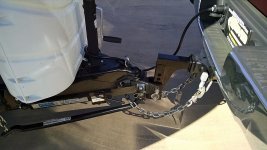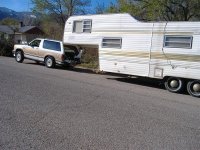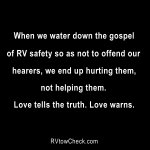DW_Gray
Well-known member
The morning after Memorial Day 2017, I became aware of a horrific tragedy in Lincoln County, Kentucky. It was caused by a travel trailer that unhitched from a truck. The trailer then moved into the opposite lane and met head-on into an SUV. The SUV driver was killed, and six-month-old Colt Tuff Shaffer was severely injured. By Thursday I learned that Colt was not going to make it. On Friday, June 2, 2017, Colt succumbed to his injuries.
I cannot ever relate to what the family has endured during this time. However, this tragedy hit me with much sorrow, sadness, and anger. Out of my anger, I created a new page entitled, How to Properly Hook Up Your Conventional Trailer at Fifth Wheel Street. I'm including some of the contents below.

First news report
One killed, three injured after bad crash in Lincoln County
Second news report
Family donating organs of six-month-old: "My baby is going to be a superhero"
How to Properly Hook Up Your Conventional Trailer
Too often news reports describe some events as “accidents” when a conventional trailer becomes unhitched while in tow. Occasionally, the mishap results in needless serious injury or death. The majority of these incidents are human error, not mechanical failure. This short video describes the routine that everyone towing a conventional trailer needs to perform when hitching every time. (Note: This safety information does not include a weight distribution system.)
Additional Safety Tips
Anyone who is safety minded will aways properly secure safety chains for any trailer they tow. Using safety chains can save people from serious injury or death. It is important to ensure that safety chains are long enough for the trailer to achieve maximum turning angle. However, the chains should be short enough not to drag on the ground and to hold the trailer tongue up off the ground if it becomes disconnected.
Always crisscross the safety chains one time. (For some states, it's the law!)
A properly matched trailer coupler and hitch ball should never fail.
Rather than using a pin to secure the locking lever, use a padlock to prevent tomfoolery.
Perform routine maintenance checks and services on the hitch assembly and trailer coupler per manufacturer specifications.
Ensure that safety chain weight ratings meet or exceed the trailer's GVWR.
Always replace worn or road filed safety chains before towing.
If someone stops by to chat with you while hitching a trailer, it will often distract you from the routine hookup and may cause you to skip an important safety step. Stop what you are doing. Either continue after the conversation ends or kindly ask individual(s) to cease their conversation until the hookup is complete and you have double checked the connections.
It is just as important that any of you who are not involved in the process of hitching a trailer is never to bother one who is doing so. Please restrain yourself.
Double check the hitch connection and recheck before leaving any location you stopped for a break or fuel fill-up.
Ensure the brake and signal wiring is not damaged and it is connected and functioning correctly.
When equipped, always attach the breakaway cable to the tow vehicle.
Periodic greasing of the hitch ball and coupler will prolong the life of these components.
I cannot ever relate to what the family has endured during this time. However, this tragedy hit me with much sorrow, sadness, and anger. Out of my anger, I created a new page entitled, How to Properly Hook Up Your Conventional Trailer at Fifth Wheel Street. I'm including some of the contents below.

First news report
One killed, three injured after bad crash in Lincoln County
Second news report
Family donating organs of six-month-old: "My baby is going to be a superhero"
How to Properly Hook Up Your Conventional Trailer
Too often news reports describe some events as “accidents” when a conventional trailer becomes unhitched while in tow. Occasionally, the mishap results in needless serious injury or death. The majority of these incidents are human error, not mechanical failure. This short video describes the routine that everyone towing a conventional trailer needs to perform when hitching every time. (Note: This safety information does not include a weight distribution system.)
Additional Safety Tips
Anyone who is safety minded will aways properly secure safety chains for any trailer they tow. Using safety chains can save people from serious injury or death. It is important to ensure that safety chains are long enough for the trailer to achieve maximum turning angle. However, the chains should be short enough not to drag on the ground and to hold the trailer tongue up off the ground if it becomes disconnected.
Always crisscross the safety chains one time. (For some states, it's the law!)
A properly matched trailer coupler and hitch ball should never fail.
Rather than using a pin to secure the locking lever, use a padlock to prevent tomfoolery.
Perform routine maintenance checks and services on the hitch assembly and trailer coupler per manufacturer specifications.
Ensure that safety chain weight ratings meet or exceed the trailer's GVWR.
Always replace worn or road filed safety chains before towing.
If someone stops by to chat with you while hitching a trailer, it will often distract you from the routine hookup and may cause you to skip an important safety step. Stop what you are doing. Either continue after the conversation ends or kindly ask individual(s) to cease their conversation until the hookup is complete and you have double checked the connections.
It is just as important that any of you who are not involved in the process of hitching a trailer is never to bother one who is doing so. Please restrain yourself.
Double check the hitch connection and recheck before leaving any location you stopped for a break or fuel fill-up.
Ensure the brake and signal wiring is not damaged and it is connected and functioning correctly.
When equipped, always attach the breakaway cable to the tow vehicle.
Periodic greasing of the hitch ball and coupler will prolong the life of these components.
Last edited:




